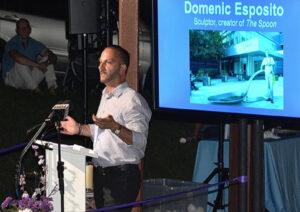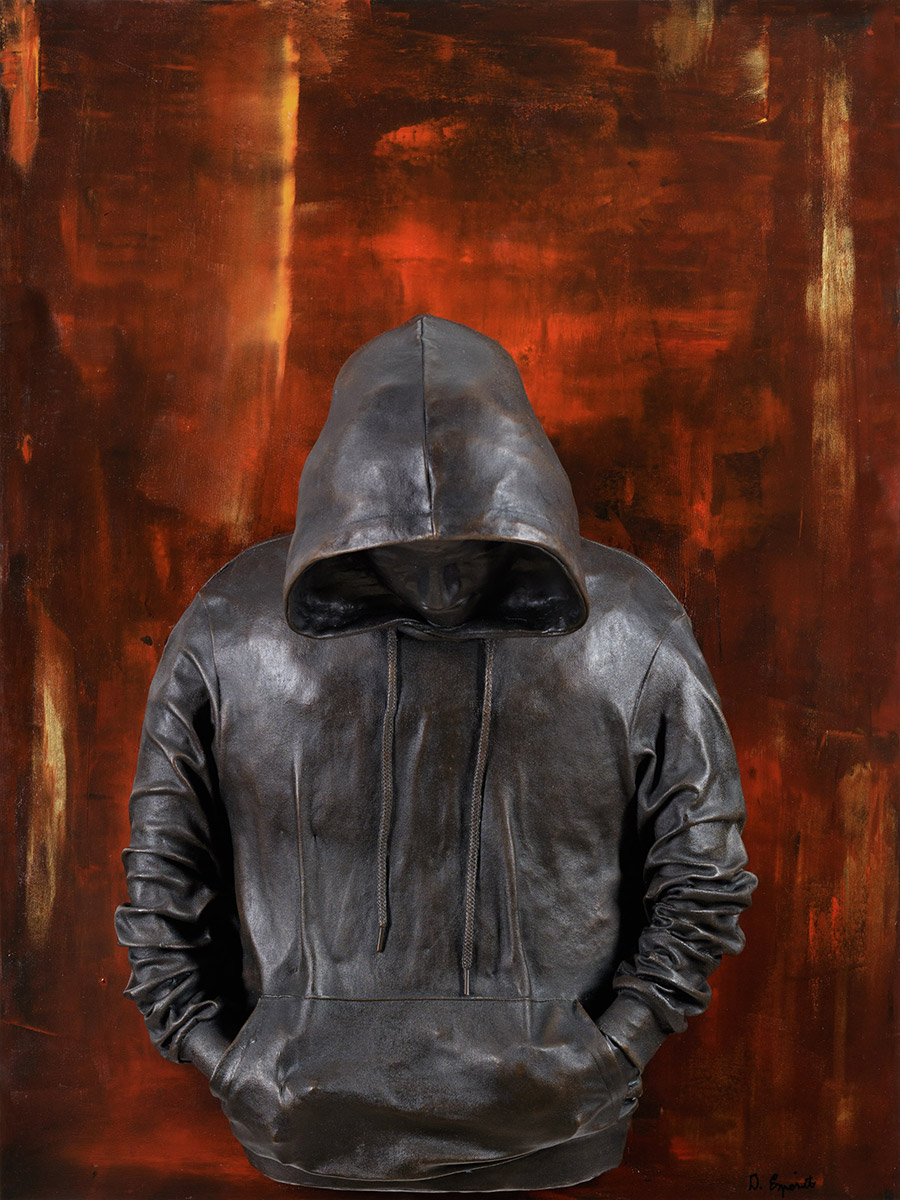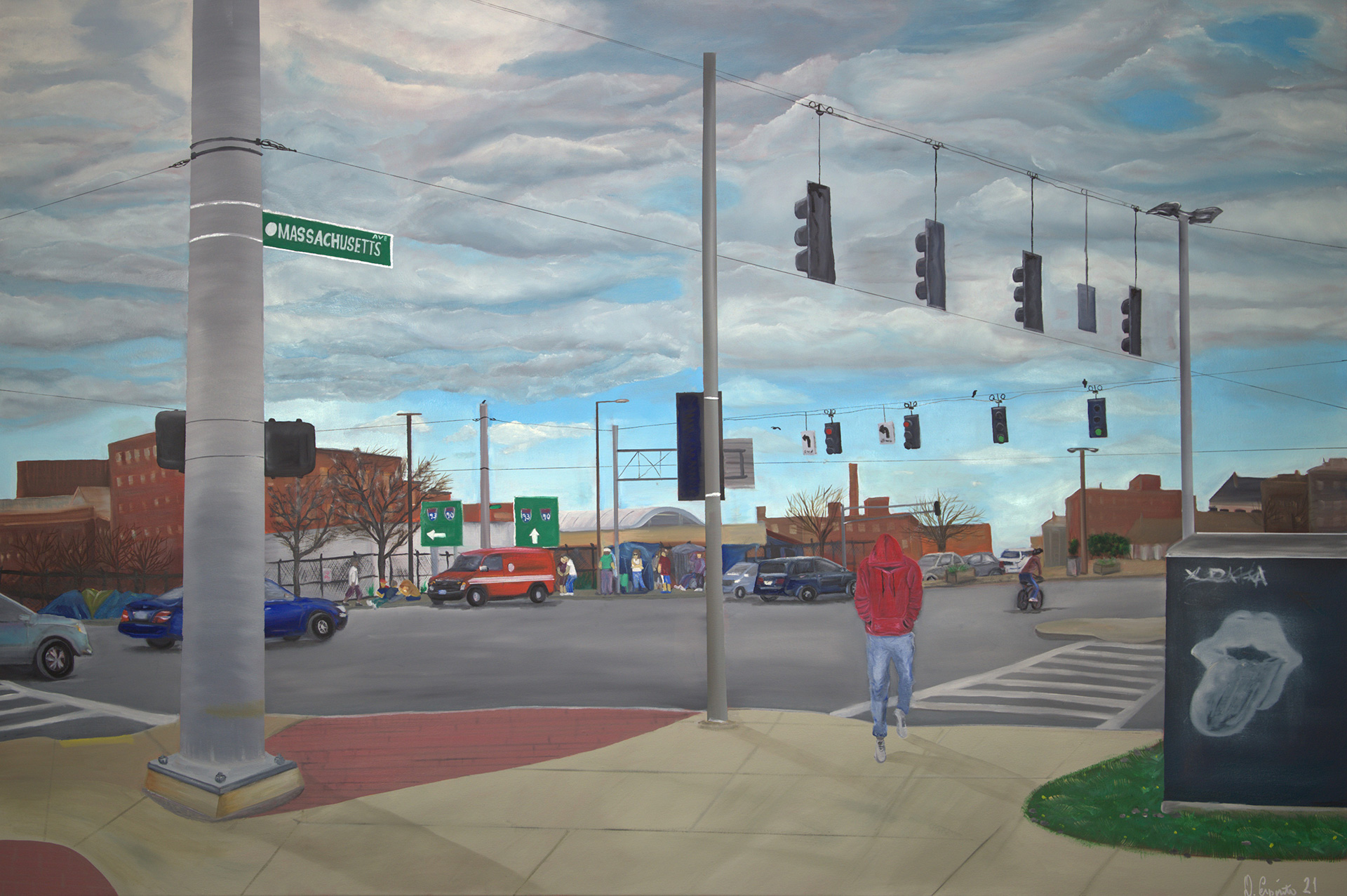By Ed Karvoski Jr., Culture Editor

Photo/Ed Karvoski Jr.
WESTWOOD – Artist and activist Domenic Esposito of Westwood developed a personal concern for the opioid crisis because his younger brother Danny battles substance use disorder (SUD).
After sculpting a 10.5-foot, 800-pound opioid spoon replica, Esposito garnered national attention by placing his protest art outside pharmaceutical and government headquarters. More people now have a better understanding of the opioid epidemic because of his art.
“Reaching people who don’t know about the opioid crisis is most rewarding and powerful,” he said. “Real change happens when more of the population has empathy for the disease.”
Reaching out to the general public

Photo/Courtesy of Domenic Esposito
Esposito’s outreach began in 2017. He spoke at his local church about addiction recovery services offered by the archdiocese. Additionally, he discussed his family’s experience with his brother’s SUD. Afterward, he heard firsthand accounts of other parishioners’ struggles with their relatives’ addiction.
“All these families opened up to me about going through similar situations,” he recounted. “It led me to think about using art to impact the sense of hopelessness that’s out there.” He stationed his first sculpted spoon outside a pharmaceutical company in 2018. As his inaugural protest venue, he chose the OxyContin manufacturer Purdue Pharma in Stamford, Conn. His brother’s SUD began with their highly-addictive prescribed painkiller.
“I wanted to point fingers at the corporations that are accountable for this manmade epidemic,” Esposito explained. In 2019, Esposito founded the nonprofit Opioid Spoon Project (OSP). Subsequent “spoon drops” took place that year at Rhodes Pharmaceuticals in Coventry, R.I., Johnson & Johnson in New Brunswick, N.J., and the Food and Drug Administration at the Department of Health and Human Services in Washington, D.C.
“Putting the spoon in front of pharmaceutical companies creates a discussion point around how we got here,” Esposito said. “Empathy is slowly changing in this country. What hasn’t changed much is government action.” Also in 2019, he organized the OSP Honor Tour. A sculpted spoon traveled to 15 cities in 10 states. Along the way, he invited individuals to sign the spoon to memorialize loved ones lost to opioids.
‘Crying out’

Photo/Courtesy of Domenic Esposito
Esposito began 2022 with his first solo exhibit presented throughout January at the Piano Craft Gallery in Boston’s Roxbury neighborhood. He named the exhibit “Vox Clamantis” (“voice of one crying out”). “I’m dealing with a subject matter that a lot of people want to pretend is not there,” he said. “It’s me and all of us crying out for help.”
Many of the over 20 works of sculptures and paintings depicted hooded figures in slouched positions. “It’s isolation and loneliness,” Esposito said of the hooded figure. “I’m creating a visceral confrontation for the viewer. It’s a call on society to engage and work with people’s mental health and SUD.”
The exhibit also included paintings set in Roxbury’s intersection of Massachusetts Avenue and Melnea Cass Boulevard (aka “Mass and Cass”). A WBUR report described this area as “the epicenter of the region’s opioid addiction crisis.” “To me, Mass and Cass has always been a place of suffering and pain,” Esposito shared. “My brother would go missing and half the time we’d go looking for him there.”
Launching new project

Photo/Courtesy of Domenic Esposito
Esposito is currently seeking images and stories for his new venture called the Memorial Doors Project to be displayed at public venues. These sculptures with bronze panels on doors depict memories of lives lost to opioids. Remembrances are also preserved with a companion audio recording. The first completed door panels memorialize Jonathan Testa, who died of a heroin overdose at age 27 in 2014. His passion for playing drums is told by his mother Kathy Leonard of Marlborough.
“This is a great way to remember loved ones―not while they used drugs, but their normal, everyday lives,” Esposito explained. With each of his projects, Esposito is particularly moved by people who have lost loved ones to opioids. “It’s been a huge inspiration to hear thousands of families’ heartbreaking stories,” he said. “It has given all of us the energy to carry on and try to make a difference.”
Learn more about Domenic Esposito at domenicesposito.com, the Opioid Spoon Project at theopioidspoonproject.com and the Memorial Doors Project at memorialdoors.com.
RELATED CONTENT:
Marking 35 years of creating signage for downtown Hudson (fiftyplusadvocate.com)
Hudson musician and published author is now creating artwork (fiftyplusadvocate.com)
Comic, actor and dad Steve Bjork is ‘almost domesticated’ (fiftyplusadvocate.com)
















